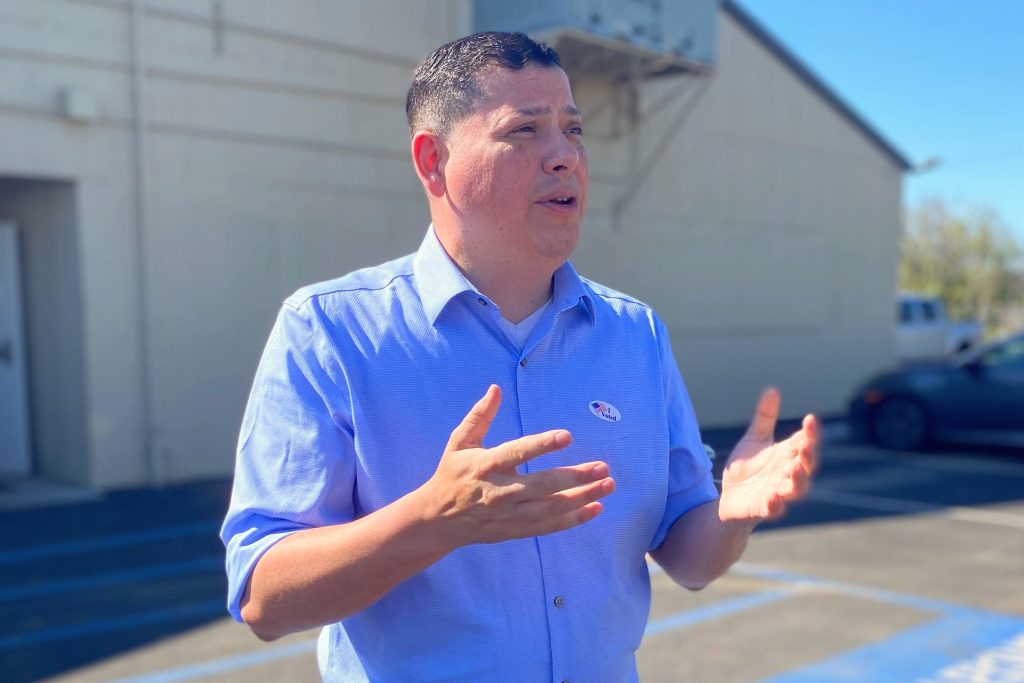Republicans are picking a fight over gas prices and climate policies in a competitive California House race that could play a key role in determining the congressional majority this November.
The National Republican Congressional Committee is attacking Democratic candidate Rudy Salas over his vote to reauthorize and extend California’s programs to curb greenhouse gas emissions as a state lawmaker in 2017.
“Even after Central Valley voters threw self-serving Sacramento politician Rudy Salas out of office, Salas is still hurting them with his zombie gas tax hike,” NRCC spokesperson Ben Petersen said in a statement. “When Sacramento Newsom bureaucrats force Valley drivers to pay 47 cents per gallon more, it will be Salas’ vote to blame.”
Salas’ campaign declined to comment on the vote, which came on a bill with bipartisan support that reauthorized California’s emissions trading system for large polluters and, debatably, its trading program for emissions from transportation fuels. His campaign manager highlighted Salas’ 2017 vote against increasing California’s gasoline tax.
“As the only Assembly Democrat to vote no on the gas tax, Rudy has shown he isn’t afraid to stand up to his own party,” Kyle Buda said in an email. “And in Congress Rudy will continue to stand up for domestic energy production right here in the Valley.”
The NRCC is backing incumbent Republican Rep. David Valadao, who also touted his support for “increasing domestic energy production” and “suspending the gas tax increase,” as well as his opposition to both California climate programs.
“Hardworking Central Valley families are struggling with the highest gas prices in the country, and our gas prices are about to go up even more thanks to Governor Newsom and Rudy Salas,” Valadao said in an email.
State regulators are planning to amend the low-carbon fuel standard in November. Experts say the program, whose proceeds subsidize electrification and biofuels, currently adds about 10 cents per gallon as fossil fuel producers pass on the costs of having to buy credits to cover their emissions. An initial report on potential changes to the program estimated an increase as high as 47 cents per gallon by 2025, though a later staff report said those estimates were incomplete and difficult to predict. The California Air Resources Board will vote on the changes Nov. 8.
It’s not the first time congressional campaign committees have seized on energy politics in this Democratic-leaning Central Valley district that Valadao first won in 2012 and defended in 2022 against Salas.
The Democratic Congressional Campaign Committee attacked Valadao last year over his vote against the Bipartisan Infrastructure Law. The DCCC contends that Valadao’s no vote stood in the way of saving a California nuclear facility — which Valadao has praised for lowering energy costs. That’s because the bill included funding for nuclear power that was later allocated to keep that facility open.
Valadao has said he supports an “all of the above approach” to energy production, including nuclear, and he cosponsored unsuccessful federal legislation in 2021 to keep the plant open.
Buda again invoked Valadao’s 2021 vote against the infrastructure law. “While Rudy’s record of standing up for domestic energy production is clear, Mr. Valadao has yet to explain why he voted to increase utility rates on Valley families by opposing funding to keep Diablo Canyon power plant operational,” he said in an email.
Valadao campaign spokesperson Faith Mabry defended his support for the nuclear plant.
“Did Rudy’s team forget it was Governor Newsom and State Democrats who led the push for the closure of Diablo Canyon?” she said in an email. “Rep. Valadao has a clear record of supporting the Diablo Canyon facility and nuclear energy in Congress — any claims otherwise are ridiculous.”







